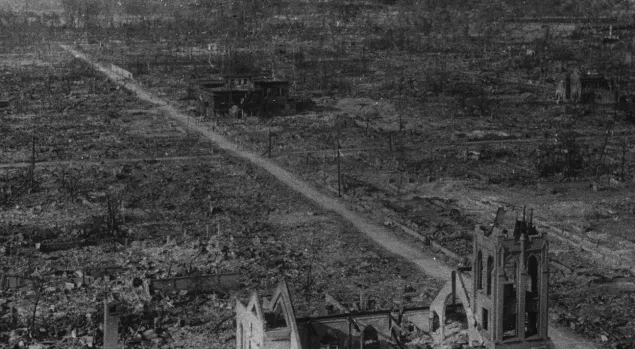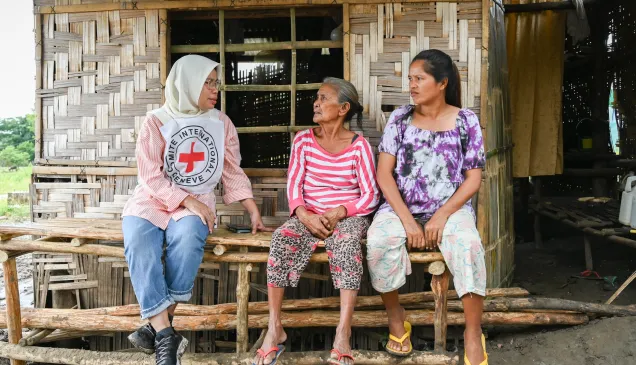Nuclear weapons - an intolerable threat to humanity
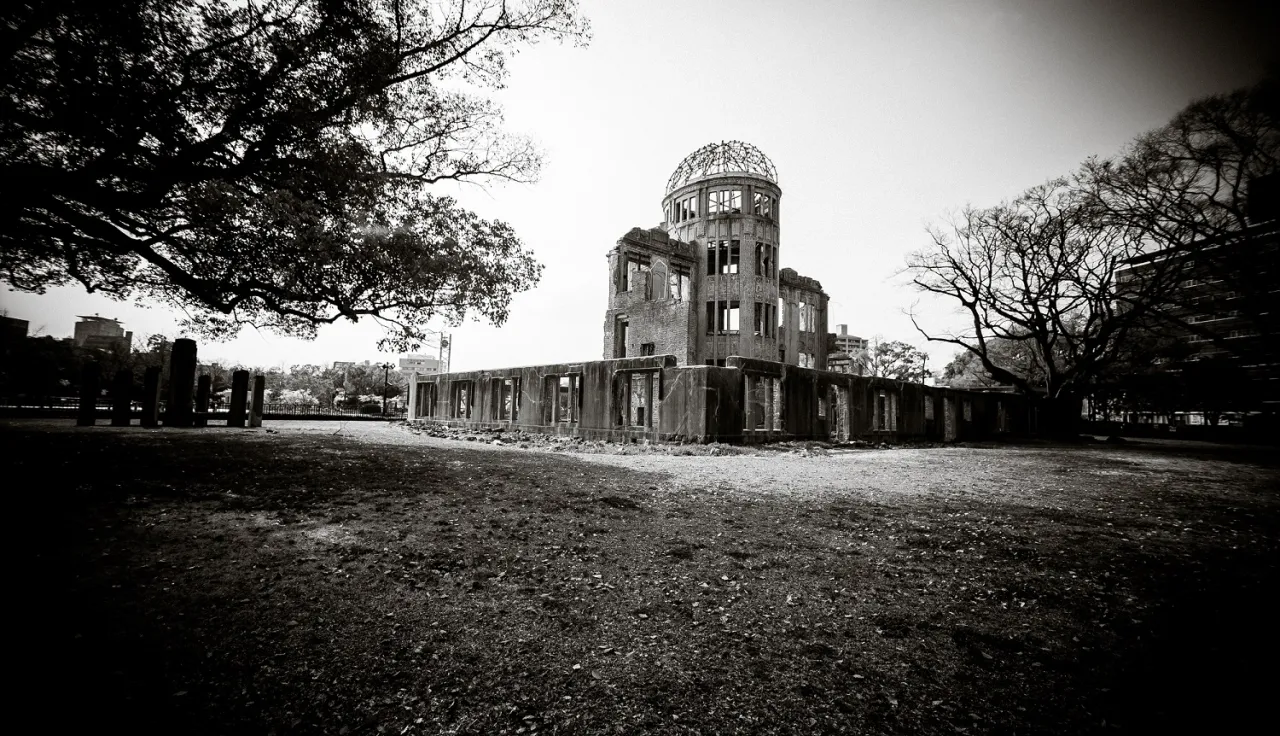
The International Red Cross and Red Crescent Movement, and most of the international community, want to ensure that nuclear weapons are never used again and are eliminated entirely. Why is it so important to act now and what can we do?
The most terrifying weapon ever invented
Nuclear weapons are the most terrifying weapon ever invented: no weapon is more destructive; no weapon causes such unspeakable human suffering; and there is no way to control how far the radioactive fallout will spread or how long the effects will last.
A nuclear bomb detonated in a city would immediately kill tens of thousands of people, and tens of thousands more would suffer horrific injuries and later die from radiation exposure.
In addition to the immense short-term loss of life, a nuclear war could cause long-term damage to our planet. It could severely disrupt the earth's ecosystem and reduce global temperatures,
resulting in food shortages around the world.
Learn more:
What effects do nuclear weapons have on health, the environment and our ability to provide humanitarian assistance? And what does international humanitarian law say? Our factsheets address these important issues.
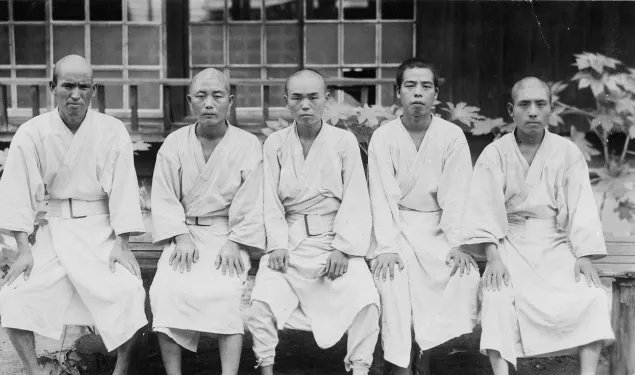
World War II. Hiroshima. People affected by gamma rays, all bald within 10 days after the explosion of the atomic bomb
Think nuclear weapons will never be used again? Think again.
The very existence of nuclear weapons is a threat to future generations, and indeed to the survival of humanity.
What's more, given the current regional and international tensions, the risk of nuclear weapons being used is the highest it's been since the Cold War. Nuclear-armed States are modernizing their arsenals, and their command and control systems are becoming more vulnerable to cyber attacks. There is plenty of cause for alarm about the danger we all face.
Learn more:
The ICRC's director-general, Yves Daccord, spoke in April last year about the heightened risk that nuclear weapons will be used and the need to abolish them, at the Nuclear Weapon Risks Symposium organized by the United Nations Institute for Disarmament Research (UNIDIR).
ICRC's Director General Yves Daccord's statement at the UNIDIR Nuclear Weapon Risks Symposium
No adequate humanitarian response
What would humanitarian organizations do in the event of a nuclear attack? The hard truth is that no State or organization could deal with the catastrophic consequences of a nuclear bomb.
The Red Cross' first-hand experience
In August 1945, in the aftermath of the atomic bombings of Hiroshima and Nagasaki, the Japanese Red Cross, supported by the ICRC, attempted to bring relief to the many thousands of dying and injured. The magnitude of the needs made us feel helpless and the International Red Cross and Red Crescent Movement has been a strong advocate for a world free of nuclear weapons ever since.
Thousands of human beings in the streets and gardens in the town centre, struck by a wave of intense heat, died like flies. Others lay writhing like worms, atrociously burned. All private houses, warehouses, etc., disappeared as if swept away by a supernatural power. Trains were flung off the rails (...). Every living thing was petrified in an attitude of acute pain. - Dr Marcel Junod, an ICRC delegate and the first foreign doctor in Hiroshima in 1945 to assess the effects of the atomic bombing and to assist its victims.
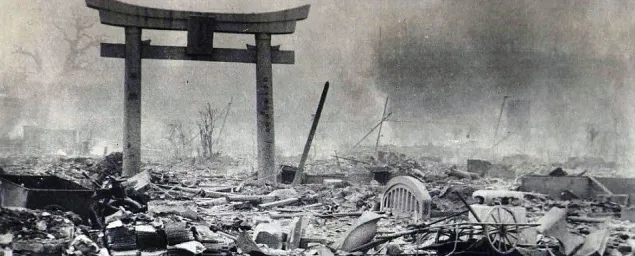
Hiroshima after the nuclear bomb explosion in 1945
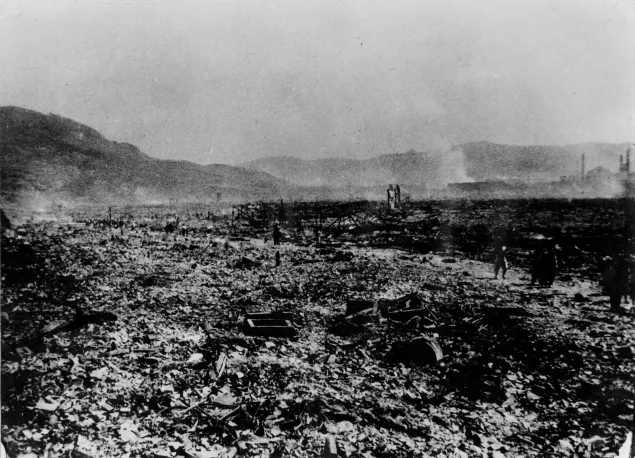
Hiroshima after the nuclear bomb explosion in 1945
Legal response to the nuclear threat
Since these atomic bombs were dropped on Hiroshima and Nagasaki in 1945, the ICRC has been calling for a ban on nuclear weapons to ensure that these dark events are never repeated. For decades, States have committed to preventing the spread of nuclear weapons and achieving nuclear disarmament through a number of international agreements, including the nuclear Non-Proliferation Treaty. Yet it was only in July 2017 that a treaty banning nuclear weapons was adopted. It was a historic and long-awaited step towards their elimination.
The world today needs the promise of this Treaty: the hope for a future without nuclear weapons. Humanity simply cannot live under the dark shadow of nuclear warfare, and the immense suffering which we all know would result. - ICRC President Peter Maurer, September 2017
What can we do?
We are all responsible for making sure that decision makers understand that nuclear weapons have no place in the world we want for ourselves or for future generations. People like you are the only ones who can make a difference.
You can raise awareness of what is at stake by:
- Putting the issue of nuclear weapons on the agendas of civic, religious, social and other organizations you're part of,
- Spreading the word by sharing this page and other reliable postings on your social media platforms, and
- Writing letters to local media to share these concerns.
Depending on where you live, you can urge political leaders and those who can influence them to:
- Fulfill long-standing commitments to nuclear weapon reductions and elimination,
- Join the Treaty on the Prohibition of Nuclear Weapons, and
- Work urgently to reduce the growing risks that nuclear weapons will be used.
